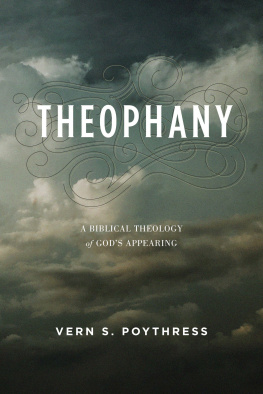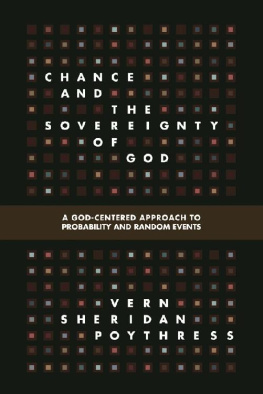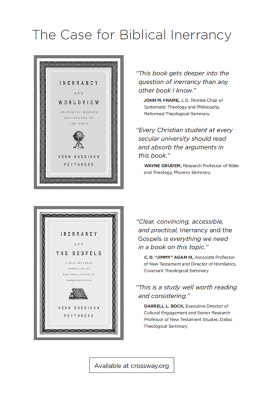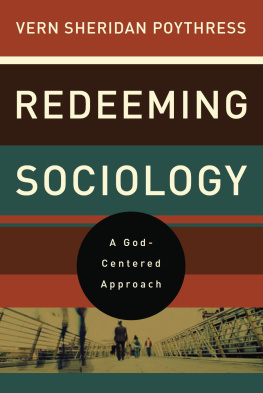Table of Contents
Landmarks
The Lordship of Christ: Serving Our Savior All of the Time, in All of Life, with All of Our Heart
Copyright 2016 by Vern S. Poythress
Published by Crossway
1300 Crescent Street
Wheaton, Illinois 60187
All rights reserved. No part of this publication may be reproduced, stored in a retrieval system, or transmitted in any form by any means, electronic, mechanical, photocopy, recording, or otherwise, without the prior permission of the publisher, except as provided for by USA copyright law. Crossway is a registered trademark in the United States of America.
Cover design: Jeff Miller, Faceout Studio
First printing 2016
Printed in the United States of America
Scripture quotations are from the ESV Bible (The Holy Bible, English Standard Version), copyright 2001 by Crossway, a publishing ministry of Good News Publishers. Used by permission. All rights reserved.
All emphases in Scripture quotations have been added by the author.
Trade paperback ISBN: -1-4335-4953
ePub ISBN: -1-4335-4956
PDF ISBN: -1-4335-4954
Mobipocket ISBN: -1-4335-4955
Library of Congress Cataloging -in- Publication Data
Names: Poythress, Vern S.
Title: The lordship of Christ : serving our Savior all of the time, in all of life, with all of our heart / Vern S. Poythress.
Description: Wheaton : Crossway, 2016. | Includes bibliographical references and index.
Identifiers: LCCN 2015036850 (print) | LCCN 2015032926 (ebook) | ISBN 9781433549540 (pdf) | ISBN 9781433549557 (mobi) | ISBN 9781433549564 (epub) | ISBN 9781433549533 (tp)
Subjects: LCSH: Service (Theology) | Christian life. | Jesus ChristLordship.
Classification: LCC BT738.4 (print) | LCC BT738.4 .P69 2016 (ebook) | DDC 248.4dc23
LC record available at http:// lccn .loc .gov /2015
Crossway is a publishing ministry of Good News Publishers.
2022-03-04 08:56:09 AM
As we serve Christ, the resources of Scripture itself have a prime, irreplaceable role. Scripture alone is infallible instruction from God. But we have noted also that there is value in later resources that are based on Scripture. We may learn from Abraham Kuyper and his successors, from the Reformation, and from Augustine. Kuypers life now lies almost a hundred years in the past. The Reformation lies almost five hundred years behind us. And Augustines strong emphasis on the sovereignty of God, which was one of the resources for the Reformation, lies even further back. With this much history behind us, we have plenty of resources. The past also gives us examples to imitateand sometimes to avoid. There are failures as well as successes. And in some cases we can see the influence of sin.
So let us consider some of the traps into which people can fall, even when they are trying to honor the lordship of Christ. There are many traps. I cannot even list them all. But this and the next chapters can at least make a beginning.
Classification of Traps
For convenience, I will classify the traps into three main groups: traps in motivation, traps in judgments about norms, and traps in assessment of the situation. These three correspond to John Frames three perspectives on ethics: the existential perspective (focusing on motivation), the normative perspective (focusing on norms), and the situational perspective (focusing on the situation).
Frames three perspectives overlap one another and reinforce one another. So our grouping into three categories includes corresponding overlaps. I will thus classify the traps according to which kind of focus is more prominent in any one trap. But all three perspectives are, in the end, relevant for each kind of trap. In addition, as an extra subdivision under the situational perspective, we will consider a fourth kind of traptraps concerning hopes for the future.
In this chapter we consider traps that have to do with failures in motivation. These traps are most evident when we use the existential perspective.
Pride
The first trap is pride . Pride has been a fundamental human problem ever since the fall. From one perspective, it can be seen as lying at the root of every sin whatsoever. Whenever we sin, we are saying that our own judgment is superior to Gods. That is pride. And we can see pride functioning when in Genesis 3 Adam and Eve listen to their own ideas (at the instigation of Satan).
Serving Christ as Lord means serving him above ourselves. It means crucifying our pride. Jesus calls on us to give up our own self -sufficiency, even our own life , for his sake:
Then Jesus told his disciples, If anyone would come after me, let him deny himself and take up his cross and follow me. For whoever would save his life will lose it, but whoever loses his life for my sake will find it. For what will it profit a man if he gains the whole world and forfeits his life? Or what shall a man give in return for his soul? (Matt. 16:2426 )
So, should we not expect that the people who are most devoted to serving Christ as Lord in all of life would be the most free from pride? Yes, we might expect that. But pride can creep in unawares. We can conceal from ourselves that we are taking pride even in our grasp of the principle of Christs lordship. We begin to say to ourselves: We understand and honor this principle of lordship, while these other, less zealous Christians do not . Look at how well we are doing! In addition to pride focused on our intellectual grasp of principles, we can take pride in our energetic practice as we participate in Christian movements and endeavors to honor Christ in politics, or business, or education. We say to ourselves, We are doing something, while so many lazy Christians are not .
Since pride is so insidious, it is worthwhile reflecting briefly on some of its dangers and how the Bible provides resources for overcoming pride. Exalting Christ means humbling ourselves and not overestimating our own importance, our own purity, or our own power.
For by the grace given to me I say to everyone among you not to think of himself more highly than he ought to think, but to think with sober judgment , each according to the measure of faith that God has assigned. (Rom. 12:3)
Put on then, as Gods chosen ones, holy and beloved, compassionate hearts, kindness, humility , meekness, and patience. (Col. 3:12)
Through the universal rule of Christ, God rules over his kingdom. We do not. It is true that the Bible promises that we who belong to Christ are already seated in the place of authority with Christ: [God] made us alive together with Christby grace you have been savedand raised us up with him and seated us with him in the heavenly places in Christ Jesus, so that in the coming ages he might show the immeasurable riches of his grace in kindness toward us in Christ Jesus (Eph. 2:57). This position of authority is part of the heritage of every Christian believer even now (note the past tense, seated). It belongs to every Christian, not just those who have special understanding. But the authority is qualified: it is spiritual authority, wholly derivative from our union with Christ, and wholly subordinate to him.
Building the Kingdom of God
Some Christians like to think that they are building the kingdom of God. But this kind of expression easily leads to equating our work with Gods work. God is the King. Fundamentally, it is God who brings his kingdom. The kingdom comes through the supernatural work of the Holy Spirit. The praise goes to God alone for his reign, as the Bible indicates:
We give thanks to you, Lord God Almighty,
who is and who was,
for you have taken your great power
and begun to reign . (Rev. 11:17)
Hallelujah!
For the Lord our God
the Almighty reigns . (Rev. 19:6)
Even within this age, Gods kingly work of salvation takes place in the lives of Christians. In this connection, God is pleased to use our humble service in the process of redemptive transformation. But it is necessary for it to be humble service, or else in practice we are acting in opposition to his kingdom rather than for it, however much we may claim the opposite. It is well worthwhile for us periodically to review the character of discipleship, as described by the Lord himself:













